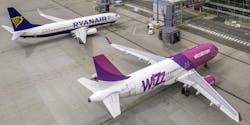The United States and the European Union said June 15 they would suspend tariffs related to each others’ major aviation manufacturers and look to establish a level playing field in trade going forward in a move the White House called “a major breakthrough.” The agreement was reached while President Biden is in Europe ahead of a Wednesday summit set for June 16.
Both parties have been at odds for more than 16 years over whether the other is providing its local large civil aviation manufacturer an unfair amount of government funding. The United States, according to the EU, gives Chicago-based Boeing Co. too much money to be a fair competitor to European aviation company Airbus: The U.S. has alleged the same of the E.U. and Airbus, and has imposed its own tariffs in response.
Most recently, in September 2020, the European Union got the OK from the World Trade Organization to place $4 billion in tariffs against U.S. goods and services connected to the Airbus/Boeing dispute. The year before, the WTO allowed $7.5 billion in U.S. tariffs against the E.U., including a 15% tax on aircraft imported from Europe and 25% on unrelated products like wine, cheese, coffee and olives.
According to a fact sheet published by the White House on the meeting, the E.U. and U.S. agreed to suspend tariffs related to the dispute for five years, establish a working group to analyze disagreements, and work towards a common set of standards on acceptable support for civil aircraft manufacturers.
President Biden, who met with European Council President Charles Michel and President of the European Commission Ursula von der Leyen, said the deal also involves the European Union and the U.S. working together to check China’s aviation subsidies.
“Significantly, we also agreed to work together to challenge and counter China’s non-market practices in this sector that give China’s companies an unfair advantage,” said Biden, in remarks following the meeting, adding the agreement was a “model” that could be used to counter China on other issues.
The civil aviation trade dispute, which spans more than 16 years, hinges on what both parties have called inappropriate government subsidies for their respective major aviation manufacturers—Boeing, for the United States, and Airbus for the European Union. As recently as February, the Biden administration’s US Trade Representative said it saw no reason to revise its Airbus-related E.U. tariffs.
In a statement, Airbus said the agreement would eliminate “lose-lose tariffs” that only further burdened the aviation industry. Boeing “welcomes” the agreement, the U.S. company said.
While the agreement marks significant progress in the E.U.-U.S. trade war, there are still some areas of contention unrelated to the aviation issue. The Biden administration has not yet moved to eliminate the United States’ Trump-era Section 232 tariffs on European steel and aluminum, which the E.U. responded to with tariffs on U.S. motorcycles, bourbon, peanut butter and denim.
Those tariffs raise the price of steel and aluminum for U.S. manufacturers who source their metals from abroad. The Coalition of American Metal Manufacturers and Users, a group of 33 trade industries, sent Biden a letter June 9 requesting that he move to repeal the tariffs they say hurt small, family-owned businesses that rely on imported metal.
“The tariffs intended to help the steel and aluminum producing industries imposed substantial costs on a much broader segment of the U.S. economy,” the June 9 letter said. On June 15, CAMMU responded to the agreement, saying its members were “disappointed” at the lack of a timeline to end the tariffs.
About the Author
Ryan Secard
Associate Editor
Ryan Secard joined Endeavor B2B in 2020 as a news editor for IndustryWeek. He currently contributes to IW, American Machinist, Foundry Management & Technology, and Plant Services on breaking manufacturing news, new products, plant openings and closures, and labor issues in manufacturing.
